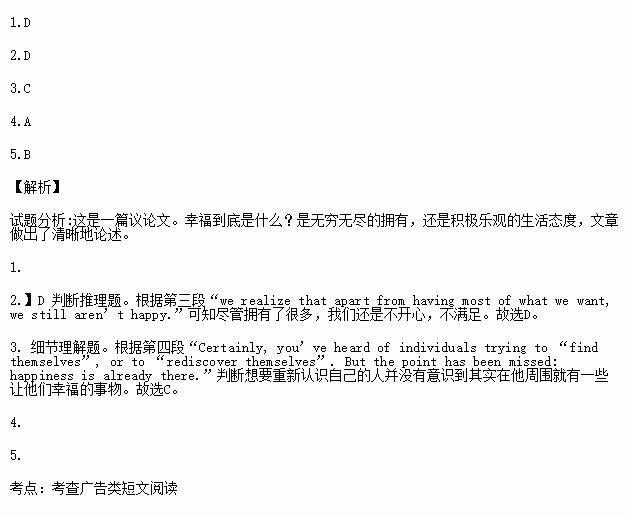题目内容
What is the definition of “happiness?” Is it material wealth filled with fancy cars, a dream house or jewelry? Or does happiness simply mean having a roof over your head? Food in the fridge? Having a swimming pool? A designer Gucci bag? Love? Money? A perfect job?
Do you recall a time----let’s say when you were about 5 years old-----what defined happiness back then? Was it getting a puppy for Christmas? Or maybe, you were a child of divorce; and all you wanted was for Mom and Dad to get back together again? Then as you got older, you were hoping that someone would ask you to the party that would have made your day. During college, good grades made you happy, but it was short-lived. Because in the real world, you had to look for a job, and competition was fierce. But then, you got a perfect job, could you be happy?
We like having and accumulating things. We work so we can pay our rents, credit card debts, school loans, car payments… The list goes on and on. And at some point, we realize that apart from having most of what we want, we still aren’t happy. Now since we’ve learned to adapt to new standards which we’ve created for ourselves, we find that we have less time, less patience, less sleep, which leads to more stress and more anxiety. Therefore, don’t stupidly make a conclusion that happiness is just based on “things”.
Sometimes, we trade our lives for not only basic necessities, but for excessive items and services as well. Certainly, you’ve heard of individuals trying to “find themselves”, or to “rediscover themselves”. But the point has been missed: happiness is already there.
Disappointments and tragedies in life will come and go, but happiness never leaves you. We can lose our jobs, but be grateful for those who love us. We can lose our homes to nature, but be thankful to be alive. If we think we are happy, we are indeed happy. Happiness is merely a perception of each individual.
Happiness is part of love, and love is an ocean. Go dive in and get some, and then share it with everyone, which can be an endless supply. But sharing happiness with people around demands skilful techniques.
1.The author puts forward a lot of questions to__________.
A. ask readers for information
B. compare answers from readers
C. expect positive answers from readers
D. draw readers’ attention to the topic
2.It can be inferred from Para.3 that___________.
A. accumulating things is not a good habit.
B. pressure and worry should be ridded of.
C. people have to work hard to pay for daily necessities
D. some aren’t satisfied with what they have possessed
3.Individuals trying to “rediscover themselves ” fail to realize that___________.
A. they haven’t got lost in the material life
B. each individual has different opinions on happiness
C. there has existed something worth making them happy
D. it is not necessary for them to bear heavy financial burden
4.People will feel happy if__________.
A. they think of the positive aspects of life
B. they seek excessive items and services
C. they have no disappointments in life
D. they can get a puppy for Christmas in their childhood
5.The paragraph following the last will probably talk about___________.
A. the definition of happiness
B. how to share happiness with others
C. the ways to rediscover happiness
D. where to seek happiness in our daily life
 轻松暑假总复习系列答案
轻松暑假总复习系列答案
